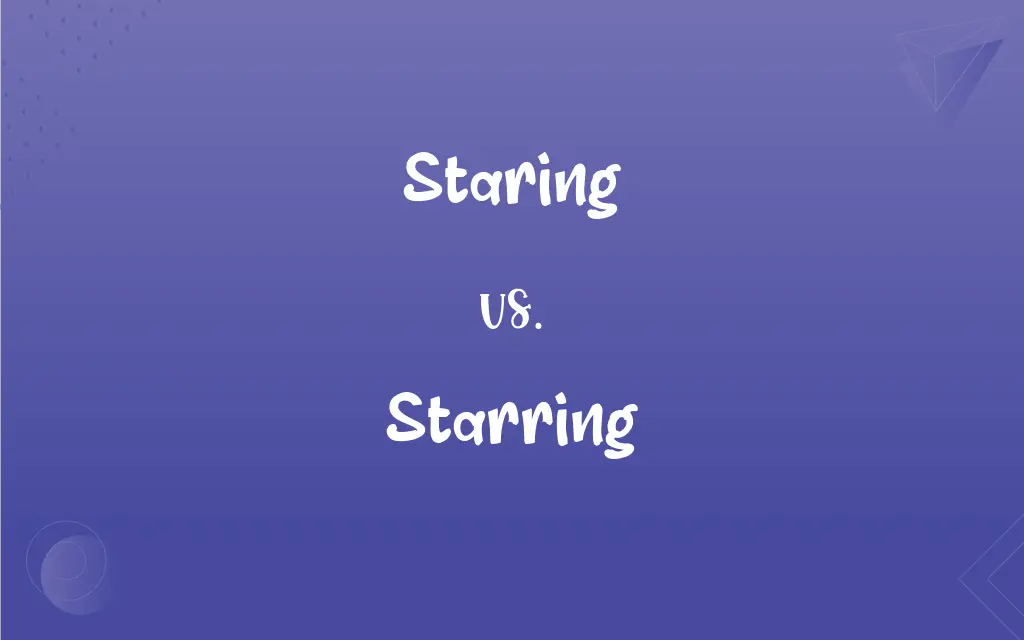Staring vs. Starring: What's the Difference?
By Aimie Carlson & Harlon Moss || Updated on March 4, 2024
Staring involves fixing one's gaze intensely on something or someone, while starring refers to playing a principal role in a performance or being featured prominently.

Key Differences
Staring is an action where one looks steadily and intently, especially in surprise, admiration, or thought, without necessarily blinking. This act can convey a wide range of emotions, from curiosity to hostility. On the other hand, starring is primarily used in the context of performances, where an actor or performer is highlighted as having a leading or principal role in a film, play, show, or other forms of entertainment. It denotes a position of prominence and recognition in the field of arts and entertainment.
While staring can happen in any setting and requires no special skills or recognition, starring is a professional acknowledgment of an individual's talent and role within the entertainment industry. Staring can be done by anyone to anything that captures their attention, whereas starring is an accolade that is earned through professional achievements.
Staring often involves a prolonged gaze that can be interpreted in various ways based on the context and the relationship between the observer and the observed. It can be seen as rude or invasive in some social contexts. Conversely, starring in a project is generally viewed positively, signaling an individual's success and prominence in their profession.
In terms of emotional impact, staring can cause discomfort, anxiety, or even fear in the person being stared at, depending on the intention and the setting. In contrast, starring in a performance is a career milestone for entertainers, often associated with prestige, admiration, and a wider audience recognition.
The act of staring does not imply any formal acknowledgment or public recognition, whereas starring is associated with public acknowledgment, media coverage, and sometimes awards, highlighting the difference in societal value and recognition between the two actions.
ADVERTISEMENT
Comparison Chart
Definition
Fixing one’s gaze on someone or something intensely
Playing a principal role in a performance
Context
Any setting
Entertainment industry
Skill/Recognition
No special skill or recognition required
Requires talent and acknowledgment in one’s field
Social Implication
Can be rude or invasive
Seen as a positive achievement
Emotional Impact
Can cause discomfort or fear
Associated with prestige and admiration
ADVERTISEMENT
Staring and Starring Definitions
Staring
Intensely looking at something without blinking.
She found herself staring at the strange painting for minutes.
Starring
To be featured prominently in a performance or event.
The dancer is starring in the festival's headline act.
Staring
Observing someone or something with intense focus.
The cat was staring at the mousehole, waiting patiently.
Starring
Featuring as the main character in a movie or play.
She is starring in the new Broadway musical.
Staring
Gazing fixedly in surprise or thought.
He was staring into space, lost in his thoughts.
Starring
Receiving top billing in a performance.
The actor was starring alongside other A-list celebrities.
Staring
To look steadily and intently, especially in astonishment.
The child was staring at the magician in awe.
Starring
To highlight or showcase talent in a performance.
He will be starring in a television drama next season.
Staring
A prolonged look often perceived as rude or invasive.
I felt uncomfortable under the stranger’s staring.
Starring
Being the principal performer.
The actress is starring in a film directed by a famous director.
Staring
To look directly, fixedly, or vacantly, often with a wide-eyed gaze.
Starring
A celestial body that generates light and other radiant energy and consists of a mass of gas held together by its own gravity in which the energy generated by nuclear reactions in the interior is balanced by the outflow of energy to the surface, and the inward-directed gravitational forces are balanced by the outward-directed gas and radiation pressures.
Staring
To look at directly and fixedly
Stared him in the eyes.
Starring
Any of the celestial bodies visible at night from Earth as relatively stationary, usually twinkling points of light.
Staring
An intent gaze.
Starring
Something regarded as resembling such a celestial body.
Staring
Present participle of stare
Starring
A graphic design having five or more radiating points, often used as a symbol of rank or merit.
Staring
The act of one who stares.
Starring
An artistic performer or athlete whose leading role or superior performance is acknowledged.
Staring
Shining; vivid, garish.
Starring
One who is highly celebrated in a field or profession.
Staring
Looking fixedly with wide-open eyes.
Starring
An asterisk (*).
Staring
(obsolete) Sensational, lurid.
Starring
The star key on a telephone
For customer service, press star.
Staring
(used of eyes) open and fixed as if in fear or wonder;
Staring eyes
Starring
A white spot on the forehead of a horse.
Staring
Without qualification; used informally as (often pejorative) intensifiers;
An arrant fool
A complete coward
A consummate fool
A double-dyed villain
Gross negligence
A perfect idiot
Pure folly
What a sodding mess
Stark staring mad
A thoroughgoing villain
Utter nonsense
Starring
A planet or constellation of the zodiac believed in astrology to influence personal destiny.
Staring
With a stare;
`quoi?' asked Blanchard, staring
Starring
Stars The future; destiny. Often used with the.
Starring
Outstanding or famous, especially in performing something
A star researcher.
A star figure skater.
Starring
Of or relating to a star or stars.
Starring
To ornament with stars.
Starring
To award or mark with a star for excellence.
Starring
To mark with an asterisk.
Starring
To present or feature (a performer) in a leading role.
Starring
To play the leading role in a theatrical or film production.
Starring
To do an outstanding job; perform excellently.
Starring
Present participle of star
Starring
(with a film as its subject) That which has the specified actor or actors, especially those in lead roles, in its cast.
Ben-Hur, starring Charlton Heston
Starring
The action of the verb to star.
Starring
Performing as a star; having the leading role.
Charlton Heston had a starring role in Ben-Hur.
Starring
Indicating the most important performer or role;
The leading man
Prima ballerina
Prima donna
A star figure skater
The starring role
A stellar role
A stellar performance
FAQs
Can staring be considered rude?
Yes, staring can be perceived as rude or invasive in many social contexts.
What does staring mean?
Staring is the act of looking intently at someone or something for a prolonged period.
Is staring always negative?
Not always; the context and relationship between the observer and observed can influence how staring is perceived.
What does starring mean?
Starring refers to playing a principal or leading role in a performance or show.
What’s the difference between a supporting role and starring?
A supporting role is a secondary character that complements the main characters, while starring roles are the central figures in a performance.
What signifies someone is starring in a movie?
Being given top billing, featured prominently in marketing materials, and playing the main character are signs someone is starring in a movie.
Is starring limited to movies?
No, starring can also refer to leading roles in plays, TV shows, and other performances.
What are the benefits of starring in a performance?
Benefits include recognition, career advancement, and potentially awards and critical acclaim.
How does one earn a starring role?
One earns a starring role through demonstrated talent, professional achievements, and often through a selection or audition process.
Does staring require talent?
Staring does not require talent, but how one interprets a stare can vary widely.
Can staring lead to misunderstandings?
Yes, staring can lead to misunderstandings, especially if the intent behind the stare is not clear.
Can anyone stare?
Yes, anyone can stare, regardless of age, status, or profession.
Does starring guarantee success in the entertainment industry?
While starring can enhance one's profile, it does not guarantee long-term success, which depends on various factors including talent, choice of roles, and market trends.
Can the context change the meaning of staring?
Yes, the context, such as cultural norms and personal relationships, can significantly change the interpretation and acceptability of staring.
Can staring communicate emotions?
Yes, staring can communicate a wide range of emotions, from interest to aggression, depending on the context.
Is staring considered a form of non-verbal communication?
Yes, staring is a form of non-verbal communication that can convey messages or emotions without words.
How do people react to being stared at?
Reactions can range from discomfort and anxiety to curiosity about the reason behind the stare.
What makes a starring role significant?
A starring role is significant due to its visibility, the talent required, and its impact on the success of a performance.
How is starring recognized in the industry?
Starring is recognized through awards, critical acclaim, and significant roles in prominent productions.
What skills are necessary for a starring role?
Skills necessary for a starring role include acting ability, presence, and the capacity to carry a performance.
About Author
Written by
Aimie CarlsonAimie Carlson, holding a master's degree in English literature, is a fervent English language enthusiast. She lends her writing talents to Difference Wiki, a prominent website that specializes in comparisons, offering readers insightful analyses that both captivate and inform.
Co-written by
Harlon MossHarlon is a seasoned quality moderator and accomplished content writer for Difference Wiki. An alumnus of the prestigious University of California, he earned his degree in Computer Science. Leveraging his academic background, Harlon brings a meticulous and informed perspective to his work, ensuring content accuracy and excellence.































































